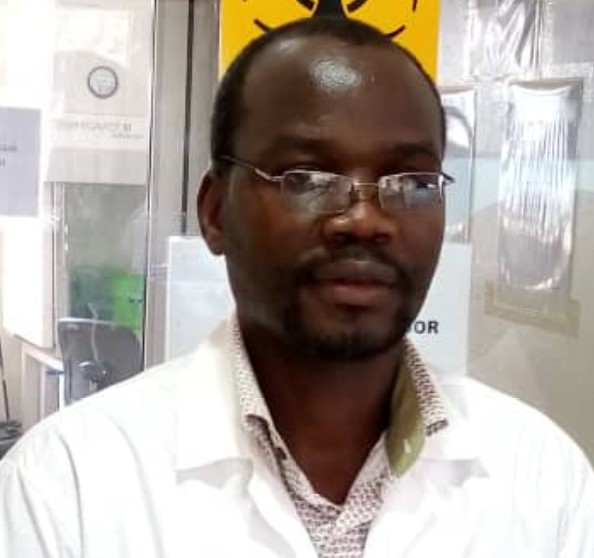Project Title
Strategies to optimize the Stability and Bio-activity of a Clinical Tuberculosis Vaccine (ID93-TBVaccine)
EDCTP Project
TMA2017CDF-1860
EDCTP Project Call
Career Development Fellowship (CDF)
Project Objectives
The objectives of this study are to:
(a) explore the use of two chemical conjugation strategies to attach ID93 to GLA-LSQ
(b) formulate thermostable single-vial lyophilised ID93 + GLA-LSQ and lead conjugates from (a).
(c) evaluate the field-based stability of the lyophilised non-conjugate and the lyophilised conjugate candidate vaccine from (b) in six health facilities in South–Western, Nigeria.
Study Design
Ethical approval from the ethics committee of the Institute of Public Health of Obafemi Awolowo University will be obtained for the use of blood samples from 30 healthy volunteers (15 male and 15 females) for the whole blood assay. The subjects will fill and sign an informed consent form permitting the use of their blood in this study. Five millilitres of blood sample will be collected every three months into heparinized blood collection tubes on the day of the assay for 18 months to help in monitoring the vaccine activity.
Inclusion criteria will include subjects that do not have any history of infection or have taken any anti-infective drugs in last 2 months and have prior exposure to BCG vaccines or tuberculin skin test (TST) to allow for the study of memory T cell responses. This subject will also be screened for Latent Tuberculosis Infection using interferon-gamma release assays (IGRAs). Pregnant women or lactating mothers and subjects that have been in contacts with TB patients in recent times will be excluded from the study.
Project Summary
Tuberculosis (TB) remains a foremost poverty-related disease with a high rate of mortality despite the global immunisation with the only available vaccine, Bacille Calmette-Guérin (BCG). This vaccine only provides some protection against the severe forms of paediatric TB but is not completely protective against the disease in infants or pulmonary TB in adults. Hence, there is an urgent need for an affordable, effective and safe newer vaccine that can protect against the disease in infants and adults.
An adjuvanted recombinant protein vaccine, developed at the Infectious Disease Research Institute (IDRI), Seattle, USA, is one of the vaccines that are in clinical development for the prevention of pulmonary TB. The current composition comprised of two vials, one containing the antigen and one containing an adjuvant, which is‘ bedside mixed’ immediately prior to immunisation. The mode of association of the adjuvant to the antigen influences immunogenicity, thus appropriate adjuvant-coupled antigens are expected to be suitable for the development of vaccines that induce humoral and cellular immunity. Moreover, lyophilisation has facilitated the formulation of thermostable pharmaceuticals containing proteins with enhanced shelf lives and reduced degradation in the presence of heat stress. Hence, this study aims at developing a strategy for the presentation of the vaccine as a single vial through conjugation and lyophilisation.
In the first reporting period, the liposome formulation was modified to contain an amino group for conjugation. Two chemical conjugation strategies explored in this study to associate the antigen, ID93 to the modified liposome, GLA-LSQ are Zero-length mediated conjugation using 1-ethyl-3-(3-dimethylaminopropyl) carbodiimide hydrochloride (EDC) and Homofunctional Mediated Conjugation using Glutaraldehyde (GA). The efficiency of the conjugation was determined using size exclusion column, Sepharose CL - 4B and the fractions were monitored for conjugation using Sodium dodecyl sulfate-polyacrylamide gel (SDS) electrophoresis with ProteoSilver™ as staining kit.
In this second reporting period, the physicochemical stability of the formulations was evaluated using HPLC (adjuvant content), dynamic light scattering (DLS –particle size analysis), and sodium dodecyl sulfate-polyacrylamide gel (SDS) electrophoresis (protein analysis). The bioactivity was assessed by cytokine stimulation using fresh whole blood from 10 healthy donors.
In the third reporting period, using an optimized lyophilization protocol on a benchtop freeze dryer, a single vial lyophilized sample of co-mixed ID93 and GLA-LSQ (coVL) and conjugate ID93-mGLA-LSQ (ConjVL) were formulated. The physicochemical stability and biological activity stability were evaluated for three months at 4ºC and 37ºC. The parameters evaluated include cake quality, melting point for the powder, while the reconstituted liposomes were assessed for liposome reformation, particle size, GLA and QS21 concentration and the integrity of ID93. Moreover, the vials of the conjugated lyophilized samples were stored in five health centres to assess the stability of the formulation outside cold chain for nine months. During this period the physicochemical stability parameters above were also assessed.
The modified GLA_LSQ Liposome formulation was found to have a particle size that was stable for one year. The SDS gel confirmed conjugation with both EDC and GA. The conjugates of ID93+mGLA_LSQ maintained liposomal and protein integrity with the two protein chemistries. The GLA and QS21 content of the vaccine were also stable for the three months. However, only the glutaraldehyde conjugates provoked significant secretion of interleukin2 (210.4± 11.45 vs 166.7± 9.15 p=0.0059), interferon-gamma (210.5 ± 14.79 vs 144.1± 4.997; p = 0.0011) and tumor necrosis factor alpha (2075± 46.8 vs 1456± 144.8; p=0.0082) compared to simple mixing. Conjugation of recombinant protein (ID93) to the liposome (mGLA_LSQ) through chemical conjugation resulted in a stable vaccine formulation which could facilitate co-delivery of the sub-unit vaccine to promote a robust immune response.
The assessment of the stability parameters for the two lyophilized formulations coVL and ConjVL, showed that they were stable at 4°C and 37°C. Moreover, the two formulations maintained their biological activity at the two storage conditions for three months, however, the conjugated formulation still maintained higher memory T cell cytokine recall response in the in vitro whole blood assay as observed with the liquid formulation.
ConVL stored at average daily room temperature of 29.3-30.7°C in five health centres across South –Western geopolitical zone of Nigeria maintained the cake quality and melting points for the nine months with less than 20% reduction in GLA and QS21 across the sites and the particle size growth was also less than 50%.
Thus, this study develop capacity for the development of conjugated and lyophilised adjuvant vaccines within the African scientific community and built a team of young scientists that could be part of the global search for vaccines for infectious diseases in Africa.
Results & Outcomes
Tuberculosis (TB) remains a foremost poverty-related disease with a high rate of mortality despite the global immunisation with the only available vaccine, Bacille Calmette-Guérin (BCG). This vaccine only provides some protection against the severe forms of paediatric TB but is not completely protective against the disease in infants or pulmonary TB in adults. Hence, there is an urgent need for an affordable, effective and safe newer vaccine that can protect against the disease in infants and adults.
An adjuvanted recombinant protein vaccine, developed at the Infectious Disease Research Institute (IDRI), Seattle, USA, is one of the vaccines that are in clinical development for the prevention of pulmonary TB. The current composition comprised of two vials, one containing the antigen and one containing an adjuvant, which is‘ bedside mixed’ immediately prior to immunisation. The mode of association of the adjuvant to the antigen influences immunogenicity, thus appropriate adjuvant-coupled antigens are expected to be suitable for the development of vaccines that induce humoral and cellular immunity. Moreover, lyophilisation has facilitated the formulation of thermostable pharmaceuticals containing proteins with enhanced shelf lives and reduced degradation in the presence of heat stress. Hence, this study developed a strategy for the presentation of the vaccine as a single vial through conjugation and lyophilisation. To achieve this goal, the study explored the use of two chemical conjugation strategies, Zero-length mediated and Homo-functional Mediated Conjugation, to associate the antigen to the liposome. Moreover, the study developed a process to freeze dry both the mixture of the antigen and the adjuvant, and the conjugated antigen-liposome to have a single-vial vaccine which was evaluated for thermostability at 4ºC and 37ºC. The thermostable vaccine was further evaluated for the field-based stability in five selected health facilities in south western Nigeria.




